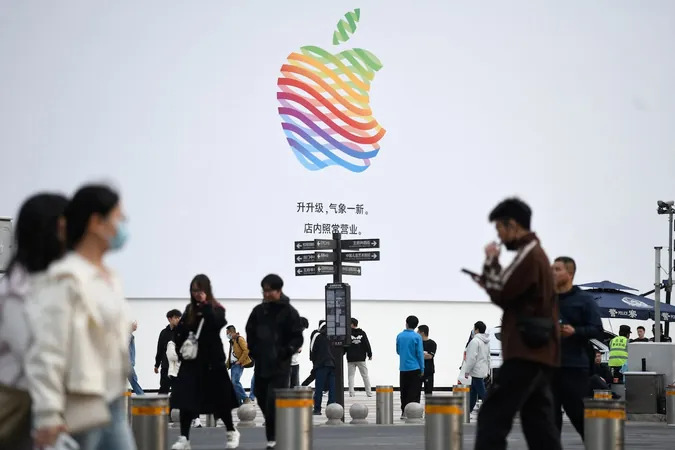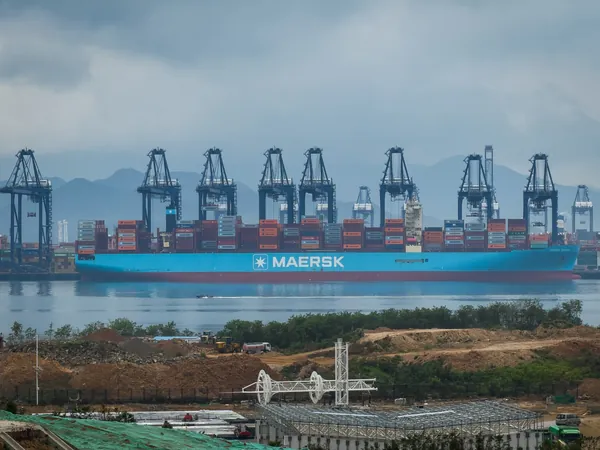
The High Stakes of Trade Wars: Will China and the EU Surrender to Trump’s Tariffs?
2025-04-08
Author: Jacob
Introduction
As tensions rise, Donald Trump is poised for an extended battle with economic giants China and the European Union, fully believing his strategy will ultimately benefit the United States. This latest escalation comes after Trump recently dismissed an enticing offer from European Commission President Ursula von der Leyen, which proposed a mutual elimination of tariffs on a range of industrial products like automobiles and chemicals. At the same time, he imposed a staggering 50% tariff on Chinese goods after Beijing refused to retract its threats of retaliation.
The Complex Game of Tariff Chicken
Trump’s aggressive approach signals a complex game of tariff chicken—one that could have dire consequences for all parties involved. Currently, he appears to be wagering that the economic vulnerabilities of China and the EU could lead them to capitulate before the U.S. does, and there’s substantial evidence to suggest he may not be entirely off the mark.
Market Reactions and Economic Sentiment
The recent turmoil in global markets provides a glimpse into the uncertainty and panic that many investors are feeling. Following a chaotic three-day sell-off that obliterated around $10 trillion in equity values, even traditionally secure investments such as gold and U.S. government bonds were unable to withstand the financial storm. The CEO of BlackRock, Larry Fink, recently commented that most leading executives believe the U.S. may already be experiencing a recession—a sentiment that resonates with many analysts.
Investor Retreat and Fear in the Markets
This dramatic backdrop has left investors scrambling. With markets in turmoil and the prospect of an all-out trade war looming over the horizon, many are retreating to cash, compelled by fears of a further downturn. The surge in the CBOE Volatility Index, often referred to as the "fear gauge," reflects deep anxiety among traders and investors alike.
Politically Charged Negotiations
Although rumors circulated regarding von der Leyen’s zero-for-zero tariff proposal potentially diffusing tensions, Trump showed no intention of retreating, disregarding calls for negotiation from within his own party—most notably from influential figures like Senator Ted Cruz. As concerns over the potential for a catastrophic recession in the lead-up to the midterm elections mount, the stakes have never been higher.
The Interdependence of Global Trade
The robust interdependence of global trade highlights the precarious nature of this economic face-off. Trade formed more than 37% of China’s GDP in 2023, compared to 27% for the United States, indicating a significant reliance on American demand. In stark contrast, the EU's trade contribution to GDP stands at 22%, underscoring just how critical U.S. trade relations are to their respective economies.
China's Export Pressures
China, in particular, is feeling the pressure. In 2024, the country exported an impressive $438 billion worth of goods to the U.S., resulting in a substantial trade surplus. Meanwhile, the EU reported a trade surplus of €157 billion with the U.S. in goods. Both surpluses have been sources of frustration for the Trump administration, which is unlikely to relent until there is a more favorable balance.
Hardline Trade Rhetoric
Peter Navarro, Trump’s chief trade advisor, recently stated that the U.S. would match the high tariffs currently levied against it by other nations, framing this not as a negotiation but as a national emergency stemming from perceived economic injustices. This hardline rhetoric suggests that the White House is far from backing down, even as economists downgrade growth forecasts and anxiety mounts among Republican lawmakers about the implications of an ongoing trade conflict.
Potential Global Repercussions
Trump’s ongoing strategy could have devastating repercussions—not just for the U.S. but also for global economies. Should China and the EU stand firm, the ramifications could lead to broader economic turmoil. While the lust for victory may currently motivate Trump's administration, the potential for a pyrrhic outcome looms large—one where the cost of victory may exceed its benefits, leaving the economic landscape drastically altered for all involved. The question remains: how long can this game of tariff chicken continue before the damage becomes irreparable?









 Brasil (PT)
Brasil (PT)
 Canada (EN)
Canada (EN)
 Chile (ES)
Chile (ES)
 Česko (CS)
Česko (CS)
 대한민국 (KO)
대한민국 (KO)
 España (ES)
España (ES)
 France (FR)
France (FR)
 Hong Kong (EN)
Hong Kong (EN)
 Italia (IT)
Italia (IT)
 日本 (JA)
日本 (JA)
 Magyarország (HU)
Magyarország (HU)
 Norge (NO)
Norge (NO)
 Polska (PL)
Polska (PL)
 Schweiz (DE)
Schweiz (DE)
 Singapore (EN)
Singapore (EN)
 Sverige (SV)
Sverige (SV)
 Suomi (FI)
Suomi (FI)
 Türkiye (TR)
Türkiye (TR)
 الإمارات العربية المتحدة (AR)
الإمارات العربية المتحدة (AR)